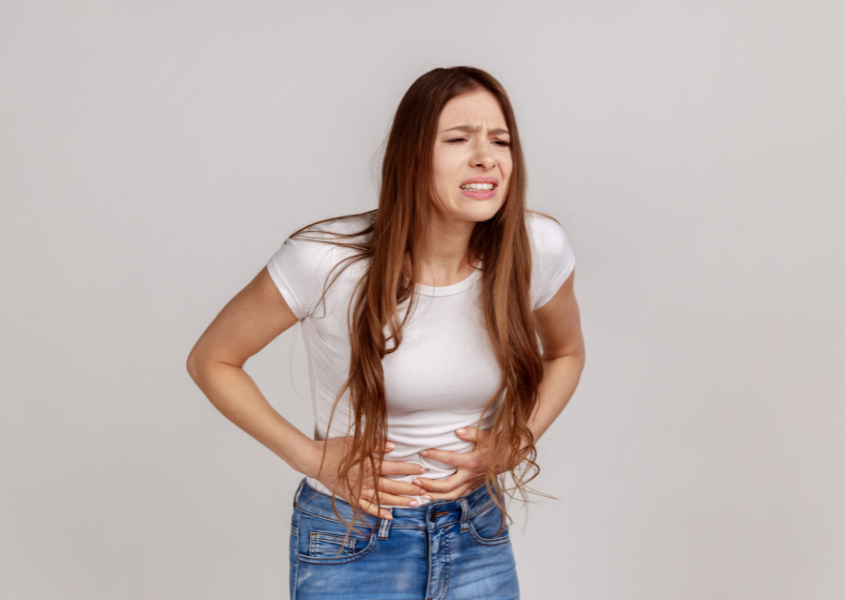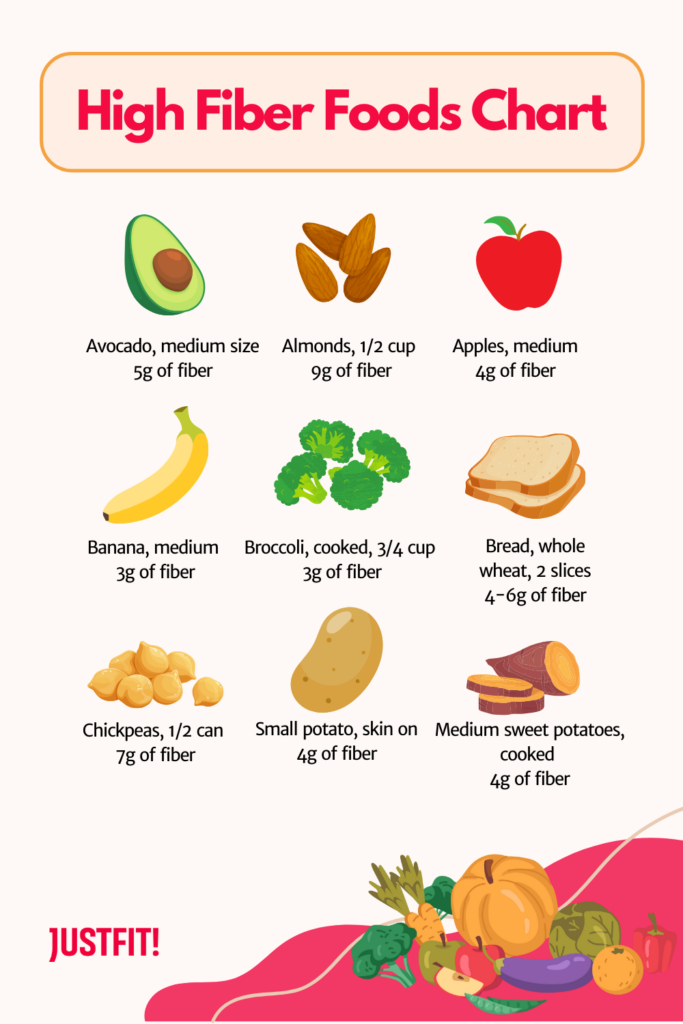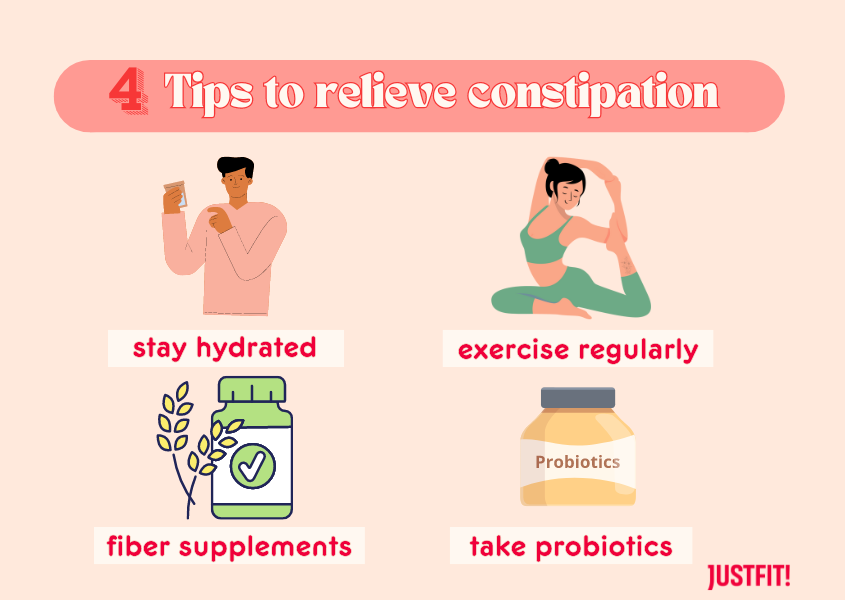




Constipation can be extremely uncomfortable for just about anyone. Imagine sitting on a toilet for a long time and having stomach ache but not being able to pass any stool. While it is a fairly common condition, it can be attributed to a lack of dietary fiber in your diet. In this article, we will share a high-fiber foods chart for constipation relief.
So, if you are unsure of how to get more fiber, this is a good chart for you to save and refer to!
Key Takeaways
- Constipation is caused by slowed bowel movements.
- Chronic constipation can affect mental well-being and lead to other physical health problems such as hemorrhoids, infections, bleeding, or prolapse.
- Consuming a high-fiber diet has many benefits, including relieving constipation.
- Adult males should consume about 34g of fiber per day while adult females should consume about 28g of fiber per day.
- Tips to relieve constipation include staying hydrated, exercising regularly, and taking fiber supplements or probiotics.
What Causes Constipation?

Constipation happens because of slowed bowel movements. When the stool moves slowly through the large intestine, the body will absorb an excessive amount of water from it. This will turn the stool hard and dry, making it difficult to pass [1].
A slowed bowel movement can be caused by factors such as:
- Consuming a low-fiber diet
- Lack of physical activity
- Hormonal changes
- Pregnancy
- Medical conditions or medications
Impact of Constipation
Having constipation occasionally is typically not a cause for concern. However, it can negatively affect overall well-being and quality of life when it becomes chronic constipation. Studies show that for patients with chronic constipation, there is a higher prevalence of mood and anxiety disorders [2].
Long-term constipation not only affects mental well-being but it can also lead to other physical health problems, including hemorrhoids, infections, bleeding, impaction, or prolapse [3].
The Role of Fiber and Digestion
Fiber is a carbohydrate that is essential to digestive health. Fiber affects the rate at which we digest food, the amount of nutrients that we absorb, and the movement of stools through the colon.
There are two types of dietary fiber– soluble fiber and insoluble fiber. Soluble fiber helps to soften the stool while insoluble fiber attracts water to the intestine, increasing stool volume and size. Both components make it easy for stools to be passed such that there is less pressure in the colon.

Benefits of a High Fiber Diet
Adopting a high-fiber diet can bring about numerous health benefits. Some of the benefits of consuming fiber-rich foods include:
- Constipation relief
- Lower blood cholesterol levels
- Better-regulated blood sugar levels
- Weight management
- A reduced risk of chronic health diseases (e.g. heart disease, type 2 diabetes, and certain cancers) [4]
High Fiber Foods Chart

It is normal that not everyone would know what kind of high-fiber foods they should be including in their diet. That is why we have created this high-fiber foods chart!
You may use this chart as a reference to know what you should be adding to your diet to relieve constipation and support good digestion. [5]
| Type of Food | Serving Size | Grams of Fiber |
| Avocado | 1/2 cup, medium size | 5g |
| Almonds | 1/2 cup | 9g |
| Apples | 1 medium | 4g |
| Artichokes | 1/2 cup | 5g |
| Banana | 1 medium | 3g |
| Broccoli, cooked | 3/4 cup | 3g |
| Bread, whole wheat | 2 slices | 4-6g |
| Brussel sprouts | 1 cup | 3g |
| Cabbage | 1 cup | 2g |
| Carrots, cooked | 1/2 cup | 2g |
| Corn, sweet | 1/2 cup | 2g |
| Chickpeas | 1/2 can | 7g |
| Figs, dried | 3 pieces | 6g |
| Pear | 1 piece | 5g |
| Green peas | 1/2 cup | 4g |
| Potato, skin on | 1 small | 4g |
| Raisins | 1 cup | 7g |
| Spinach, cooked | 1/2 cup | 2g |
| Sweet potatoes, cooked | 1 medium | 4g |
When starting a high-fiber diet, it is highly recommended that you increase fiber intake gradually. Gradually increasing fiber intake will allow the gut to adjust accordingly and can reduce the risk of digestive side effects like bloating or diarrhea.
How Much Fiber Do We Need A day?
The amount of fiber that we need each day may vary according to age and gender. However, experts generally recommend that adult males should consume roughly 34 grams of fiber per day while adult females should consume about 28 grams. Adolescents and teenagers should get about 20 grams to 30 grams per day. [6]
Of course, this is just a general guideline. The best way to ensure that you are getting all the fibers that you need for a healthy digestive system is to eat plenty of whole grains, fruits, and vegetables.

Other Tips To Relieve Constipation
Besides having a high-fiber diet, there are other methods that you may try to relieve constipation. Below are 4 tips to help you to ease constipation easily.
1. Stay hydrated
Sometimes, the reason why you may be dealing with constipation is because you are not drinking enough water. Increasing your water intake is one of the best ways to prevent and relieve constipation naturally at home. So, remember: don’t skip water and drink plenty of it!
2. Exercise regularly
Another reason why it is common for people to get constipation is due to the fact that they are not exercising regularly. Leading a sedentary lifestyle in the long term would eventually slow processes in your body down. Getting physical activity in helps to stimulate the muscles in your digestive system and promote bowel movements.
If you are looking for exercises or workout plans to follow, try out the JustFit app. JustFit provides a huge variety of exercises from at-home workouts, bed workouts, and chair workouts from yoga to pilates. Get your gut moving and start your fitness journey today!
3. Fiber supplements
An alternative to consuming high-fiber foods would be to take fiber supplements. Taking a fiber supplement can help to induce bowel movements by adding volume to your stool. This will allow it to push through your intestine and out of your body more easily.
4. Take probiotics or eat foods with probiotics
Lastly, taking probiotics can help reduce constipation. Probiotics are live bacteria that provide many digestive health benefits, such as improved gut health and softened stools for passing. In fact, a 2017 review found that probiotics helped to improve constipation in older individuals by 10-40% compared to those who had not taken it. [7]
So, if you are suffering from constipation, consider consuming probiotic foods such as kefir, yogurt, or kombucha, or taking probiotic supplements.

Conclusion
At the end of the day, constipation is not a life-threatening condition. By combining the right diet and adjusting your lifestyle habits, you will be able to treat it. If it becomes a chronic issue that starts to affect daily activities, consider seeking advice from a medical professional and starting a proper course of treatment.
What are the best high-fiber foods for constipation?
What is the best fiber to take daily for constipation?
What foods should you avoid when constipated?
Hosseinzadeh, S. T., Poorsaadati, S., Radkani, B., & Forootan, M. (2011). Psychological disorders in patients with chronic constipation. Gastroenterology and hepatology from bed to bench, 4(3), 159–163.
Ioniță-Mîndrican, C. B., Ziani, K., Mititelu, M., Oprea, E., Neacșu, S. M., Moroșan, E., Dumitrescu, D. E., Roșca, A. C., Drăgănescu, D., & Negrei, C. (2022). Therapeutic Benefits and Dietary Restrictions of Fiber Intake: A State of the Art Review. Nutrients, 14(13), 2641. Available from: https://doi.org/10.3390/nu14132641
Khatri, M. (2023) How Chronic Constipation Affects Your Body [online]. Available from: https://www.webmd.com/digestive-disorders/chronic-constipation-affects-body#1-3
Martínez-Martínez, M. I., Calabuig-Tolsá, R., & Cauli, O. (2017). The effect of probiotics as a treatment for constipation in elderly people: A systematic review. Archives of Gerontology and Geriatrics, 71, 142-149. Available from: https://doi.org/10.1016/j.archger.2017.04.004
Mayo Clinic (2023) Constipation [online]. Available from: https://www.mayoclinic.org/diseases-conditions/constipation/symptoms-causes/syc-20354253
US Department of Agriculture (n.d.) FoodData Central [online]. Available from: https://fdc.nal.usda.gov/
US Department of Agriculture (n.d.) Dietary Guidelines for Americans 2020-2025 [online]. Available from: https://www.dietaryguidelines.gov/sites/default/files/2020-12/Dietary_Guidelines_for_Americans_2020-2025.pdf





